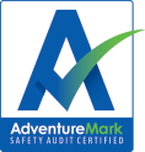Outdoor Qualifications and Auditing
Qualifications and Auditing
The Safety Audit Standard for Adventure Activities states that, to verify staff competence, ‘Nationally recognised qualifications should be used where relevant’.
Audit bodies need confidence that operators are working to a high level of safety standards, and qualifications are one way to evidence this. The alternatives are internal assessment and attestation, which can be cumbersome for the operator and less reliable for the auditor.
Qualifications are about individual competency
While some believe that qualifications should exempt operators from the audit process, this doesn’t really hold water. While outdoor qualifications benchmark you against an instructing or guiding standard, it doesn’t necessarily mean you can run a company safely. That is a very different skill set.
A good analogy is a taxi company: you may be a good, confident, licensed driver, but it doesn’t mean you can run a taxi company well.
The audit looks at a huge number of aspects, and staff competency is just one area we look at, even though it’s a very important area. As humans, we make mistakes and need good safety systems in place to back us up. I’ve seen very good instructors working in operations that simply don’t have good systems in place for them to operate safely.
Qualifications do have benefits
When an audit body carries out a site visit, qualifications do give an extra level of confidence. Qualifications have benefits and can save time onsite for the audit team and reduce the audit cost for operators.
If you run an operation with no qualified staff, you’re required to provide evidence that your competence has been verified by a technical advisor*. Your hazard assessment and risk management processes and annual reviews also need to involve a technical advisor. Technical advisors can be internal or external and shouldn’t be confused with the technical experts used by the audit bodies. The latter are independent, impartial, and aren’t allowed to allowed to provide specific advice.
Staff with the right level of nationally recognised qualifications and experience can act as a technical advisor internally. This saves operators the cost of bringing in external advisors or consultants. However, it’s still a good idea to have an external pair of eyes look over your systems because when you’re close to an operation you can miss things.
Qualified staff can also mean that your audit certification will cover a wider geographic scope. The audit body may be more confident in certifying you to operate in wider locations if staff have qualifications, particularly high-level qualifications.
For example, an operation with caving instructors who aren’t qualified may only be certified to operate in one local cave network. A company that uses NZOIA Cave 2 instructors may find that the audit body is happy to certify them for cave networks across New Zealand.
There will be more demand for qualified staff
Overall, qualifications give the audit team an extra level of confidence and should make the audit process smoother. It’s important that qualification bodies work hard with operators to develop qualifications that are relevant to the ever-evolving industry and are widely available across the country. As the industry grows and matures, there will be more and more demand for staff with professional qualifications.
* For the definitions of technical advisor and technical expert, please see the Safety Audit Standard for Adventure Activities 2017
Jamie Simpson is the General Manager of AdventureMark and also works as an investigator and trainer for Kelvin TOP-SET. Jamie and Stu Allan will be covering this topic, along with other areas of the audit process, at the NZOIA Symposium.
For more information please go to www.adventuremark.co.nz

